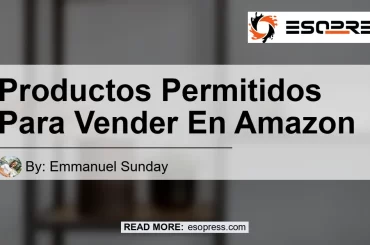

In the realm of online retail, Amazon has strict guidelines and policies in place to protect intellectual property rights and ensure fair business practices. One such provision is Section 3 of Amazon’s Business Solutions Agreement, which addresses violations that range from copyright infringements to the sale of counterfeit goods. In this article, we will delve into the details of Amazon Section 3 violations, their potential consequences for sellers, and how they can be avoided.
Contents
What is Section 3 of Amazon Business Solutions Agreement?
Section 3 is a segment of Amazon’s Business Solutions Agreement, a contractual agreement that governs the relationship between Amazon and its third-party sellers. This section grants Amazon the right to terminate the seller’s account in the event of a violation. While it may sound intimidating, Section 3 serves as a deterrent to prevent sellers from engaging in activities that could harm Amazon’s reputation or infringe upon intellectual property rights.
Understanding the Consequences
A violation of Section 3 can have severe repercussions for sellers. Amazon has the authority to suspend or deactivate the seller’s account, resulting in the loss of their product listings and the potential loss of income. This can significantly impact a seller’s business, especially if they heavily relied on Amazon for sales. Additionally, repeated violations could lead to a permanent ban from selling on Amazon’s platform.
Types of Violations: Copyright Infringements and Counterfeit Goods
Section 3 violations encompass a wide range of offenses, but two common categories are copyright infringements and the sale of counterfeit goods. Let’s take a closer look at each:
Copyright Infringements
Copyright infringement occurs when a seller uses copyrighted material without proper authorization. This can include using product images, descriptions, or branding that belongs to someone else. Amazon takes copyright infringement very seriously and has implemented measures to protect the rights of copyright holders. Sellers found guilty of copyright infringement may face account suspension or closure.
Sale of Counterfeit Goods
Another serious violation under Section 3 is the sale of counterfeit goods. Counterfeit products are unauthorized replicas of branded items, often intended to deceive buyers into believing they are purchasing genuine products. Amazon has a zero-tolerance policy for counterfeit goods and employs various methods, including brand registry programs and rights owner complaints, to combat the sale of these items on its platform. Sellers found selling counterfeit goods face immediate account suspension and potential legal consequences.
How to Avoid Section 3 Violations
To ensure compliance with Section 3 and maintain a good standing on Amazon‘s platform, sellers should adhere to the following guidelines:
1. Respect Intellectual Property Rights
Always respect intellectual property rights by obtaining proper authorization to use any copyrighted materials. This includes product images, descriptions, and brand logos. If in doubt, seek legal advice or permission from the rights holder before using any copyrighted content.
2. Source Products from Authorized Suppliers
To avoid selling counterfeit goods, only source products from authorized suppliers and reputable manufacturers. Conduct thorough due diligence to verify the authenticity of the products you plan to sell.
3. Monitor and Address Complaints Promptly
Pay close attention to any complaints or infringement notices received from rights holders or customers. Promptly address any issues and take the necessary steps to rectify the situation. This includes removing infringing listings and following up with affected parties to resolve disputes.
4. Stay Updated on Amazon’s Policies
Regularly review and familiarize yourself with Amazon’s policies, including the Business Solutions Agreement. Stay informed about any changes or updates to ensure compliance with the latest guidelines.
5. Seek Professional Assistance
If you are unsure about any aspect of selling on Amazon or have concerns about potential violations, consider seeking professional assistance. You may consult with an attorney specializing in intellectual property or engage the services of an Amazon compliance expert to ensure you are operating within the platform’s guidelines.
By following these best practices, sellers can minimize the risk of Section 3 violations and maintain a successful business presence on Amazon.
Conclusion: Recommended Product – Counterfeit Detection Tool
In conclusion, compliance with Amazon’s Section 3 violations is crucial for sellers to protect their accounts and maintain a trustworthy reputation. As a recommended product, we suggest using the Counterfeit Detection Tool. This tool helps sellers identify and remove counterfeit listings, ensuring a safe and legitimate selling environment. Get the Counterfeit Detection Tool here.


Remember, always prioritize legal and ethical business practices to thrive as an Amazon seller and contribute to a fair online marketplace.






